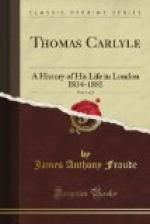|
This section contains 4,526 words (approx. 16 pages at 300 words per page) |

|
Dictionary of Literary Biography on Thomas Carlyle
Thomas Carlyle's writings so influenced nineteenth-century British social, political, and aesthetic thought that he has been called a Victorian prophet or sage. He rejected both traditional Christianity and the skepticism of the eighteenth century in favor of a secular faith based on wonder, vitality, and imagination--what Carlyle called "natural supernaturalism." He emphasized the necessity of the destruction of old institutions and modes of thought by permanent revolution, but he also condemned democracy. Most people, he argued, are followers and need the gifted leadership of a hero. Carlyle's interest in great men and in the decay and regeneration of ideas and social structures impelled him toward history and biography; for Carlyle, "History is the essence of innumerable biographies."
Carlyle produced important works of literary biography and criticism, particularly of German Romantic writers. Between 1822 and 1832 he wrote some twenty major essays (collected in his Critical and Miscellaneous Essays, 1838) that helped...
|
This section contains 4,526 words (approx. 16 pages at 300 words per page) |

|


